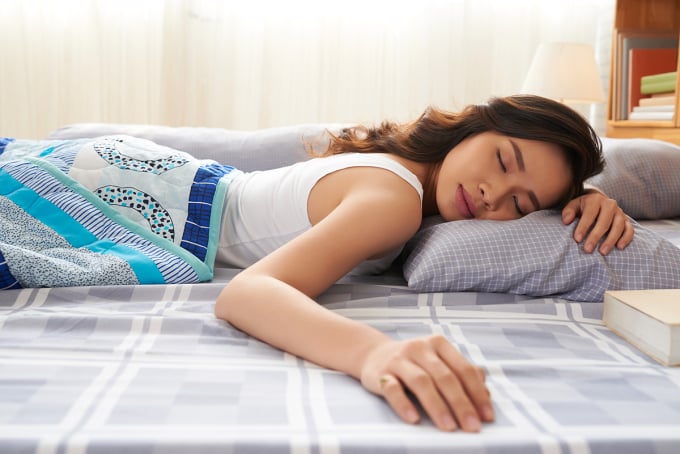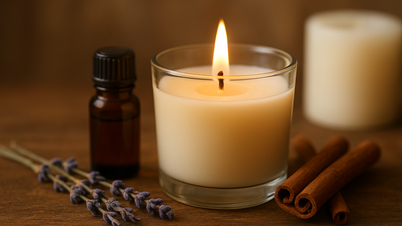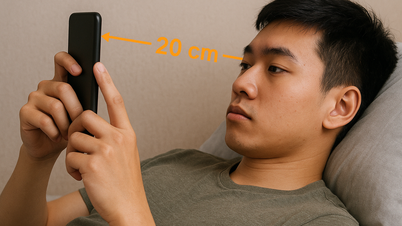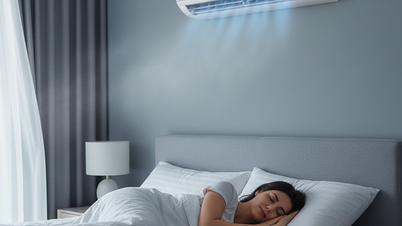Experts recommend opening the window slightly if the temperature is not too high, lying close to the ground, and using bedding made from natural fibers, which can help you fall asleep faster in hot weather.
Temperature is one of the factors that most affects sleep. Too hot weather makes many people toss and turn, unable to fall asleep, leading to restlessness all night. Lack of sleep causes cognitive performance to decrease, memory is affected, and concentration is reduced.
Normally, the human body temperature drops slightly during sleep. A cool, not too cold sleeping environment is suitable for good sleep, the ideal temperature is 18.3 degrees Celsius.
Before falling asleep naturally, the body produces the hormone melatonin, which lowers body temperature, according to sleep therapist Christabel Majendie. Melatonin is important because it regulates the natural sleep cycle, signaling the body that it is time to rest. Humans start producing melatonin when light levels decrease, and stop secreting the hormone when light levels increase.
If the ambient temperature is too high, this process is disrupted, making it take longer for you to fall asleep. Majendie reveals some tips to improve sleep in hotter weather.
The first method is to open the window slightly to let cool air from outside into the room. Citing research published in 2021, Dr. Sammy Margo, a sleep expert at Dreams, said that heat exposure increases alertness and reduces the amount of rapid eye movement (REM) sleep a person spends. This is the stage of sleep associated with vivid dreams due to increased brain activity.
“Breathing in cool, fresh air can help improve this. Cool air entering the room also helps cool the body throughout the night – which is essential for a good night's sleep,” explains Dr. Margo.

Using underwear and bed sheets made of natural materials helps to cool down while sleeping. Photo: Freepik
The National Sleep Foundation also points out the relationship between fresh air and feelings of restfulness. Air provides a cooling effect, allowing the body to relax and breathing to stabilize. Opening windows slightly at night also helps reduce the buildup of emissions from pets, dust mites and carbon dioxide. High levels of carbon dioxide increase the likelihood of waking during the night, reducing sleep quality.
The next option is to lie on a low bed. In Japan, people often use futons - mattresses placed directly on the floor. According to Dr. Majendie, lying close to the ground can make people feel cooler.
You can reduce the amount of clothes you wear when sleeping, remove the bed sheets, and limit the number of pillows on the bed. Experts recommend using clothes and blankets made of natural fibers, because they regulate body temperature better than synthetic fibers. Changing the bed sheets to cotton or breathable linen will help you sleep well in the summer.
“The important thing to remember is not to worry too much about a bad night’s sleep,” says Dr. Majendie. If you wake up suddenly because of the heat, experts recommend not checking the clock. Realizing you’re awake at 3 a.m. when your alarm is set for 7 a.m. can create a feeling of pressure about not getting enough sleep. When stress kicks in, cortisol levels rise and the body becomes alert. This process prevents the brain from maintaining a sleepy state.
In addition to adjusting your room and body temperature, experts recommend that people establish healthy daily sleep habits. Avoiding caffeine late in the day and avoiding blue-light screens in the hours before bed can help the brain slow down and the body relax.
Thuc Linh (According to Healthline )
Source link







![[Photo] Hanoi morning of October 1: Prolonged flooding, people wade to work](https://vphoto.vietnam.vn/thumb/1200x675/vietnam/resource/IMAGE/2025/10/1/189be28938e3493fa26b2938efa2059e)


























![[Photo] President Luong Cuong receives President of the Cuban National Assembly Esteban Lazo Hernandez](https://vphoto.vietnam.vn/thumb/1200x675/vietnam/resource/IMAGE/2025/9/30/4d38932911c24f6ea1936252bd5427fa)
![[Photo] Panorama of the cable-stayed bridge, the final bottleneck of the Ben Luc-Long Thanh expressway](https://vphoto.vietnam.vn/thumb/1200x675/vietnam/resource/IMAGE/2025/9/30/391fdf21025541d6b2f092e49a17243f)
![[Photo] The 1st Congress of Phu Tho Provincial Party Committee, term 2025-2030](https://vphoto.vietnam.vn/thumb/1200x675/vietnam/resource/IMAGE/2025/9/30/1507da06216649bba8a1ce6251816820)



































































Comment (0)